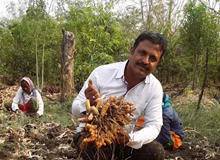
Several merchants sit on the floor with products to offer at Goa's Mapusa Friday market, while the treasured soursop sits on a side stool. When questioned about the price, a dealer says Rs 800 per piece, which may sound reasonable given that the fruit may cost up to Rs 2000 per piece.
In a separate alley, another vendor was selling soursop for a bit more than Rs 900. So, what makes Soursop so expensive? It resembles a jackfruit, according to the natives.
The inconspicuous fruit endemic to South America and the West Indies, known locally as Juliao, Laxman phal, and Ranpatpanas, has several remarkable characteristics.
Soursops were originally noted by Oviedo in 1526 in regard to their development in their native locations, according to Julia Morton's book "Fruits in Warm Climates." In addition to avocados and cocoa, records show that the Mesoamericans in the tropical lowlands ate soursop.
Indeed, creation tales include the gods bestowing a bountiful harvest of fruits such as custard apple, soursop, mameys, and others. Soursops were one of the earliest fruits transported to Asia by Spanish sailors, even if they weren't used as a medium of trade like cacao beans.
Today, many countries grow soursop including China, Australia, Vietnam, the Philippines, Malaysia, Cuba, Puerto Rico, the Bahamas, Venezuela, Argentina, West Africa, Mexico, and parts of Central America. Few regions produce soursop commercially: on the shortlist is the Philippines, nations in the Caribbean, and parts of South America.
In India, Where Can You Get Soursop?
Soursops are grown in gardens and as a hobby crop in India. In other parts of the country, this hobby crop has turned into a health obsession.
Soursop is only found in small quantities in India's southern subtropical areas, such as Tamil Nadu, Karnataka, Andhra Pradesh, and Kerala.
The fruit can also be found growing wild in certain areas. Soursops do best in well-drained, semi-dry soil at elevations below 1,000 metres and flourish in tropical climates. They do not survive cold and grow best in well-drained, semi-dry soil.
Despite its appealing flavour (imagine pineapples, muskmelon, and coconut all rolled into one), soursop isn't commonly found in supermarkets. Indians who grew up eating the fruit often talk about a tree in their backyards or behind a neighbor's fence.
Nonetheless, when in season, a few make their way into the marketplaces of Chennai, Goa, and Bengaluru. The custard apple, a close cousin of the soursop, has a far greater chance of being found.
It's Being Hailed As a Cancer Cure
Soursop's leaves and petals are sudorific, or sweat-inducing, according to the book "Medicinal Plants in Andhra Pradesh."
The blooms and buds are used to cure catarrh and cough, while the leaves are used to treat fever, diarrhoea, stomach disorders, and function as an antihelmintic when infused.
As an antispasmodic, parasiticidal, and piscicidal, a root decoction is used. Green bark is an astringent and powerful purgative, according to the authors.
Soursop leaves and fruit are also known to have anti-cancer properties.
Soursop is said to be a "miracle natural cancer cell killer 10,000 times stronger than chemotherapy," according to some studies.
Graviola extracts have been shown in laboratory experiments to destroy several types of liver and breast cancer cells, according to Cancer Research UK. Some chemotherapeutic treatments are resistant to these cells. Graviola pulp extract has been shown to have an effect on prostate cancer cells in mice in a recent study. However, no human research have been conducted.
Graviola pills are advertised and promoted as a cancer treatment on several websites. However, they are not supported by respectable scientific cancer organisations.
Modern scientists have been investigating the plant for 50 years, according to a medically vetted article on WebMD. "Graviola appears to hold promise for them. In test tubes and animal experiments, they discovered that it destroys cancer cells. What they don't know is if it works as a cancer therapy in humans "It declares.
The soursop is accustomed to humid environments with mild winters; temperatures below 5 degrees Celsius will harm leaves and short branches, while temperatures below 3 degrees Celsius can be deadly.
Soursop is typically reproduced by seeds, however fiberless types can also be grafted.
Soursop is likewise being heralded as the fruit of the future. However, it is simply another garden tree with magical therapeutic capabilities in regions like Goa, Karnataka, and Tamil Nadu.
Source: Indiatimes











